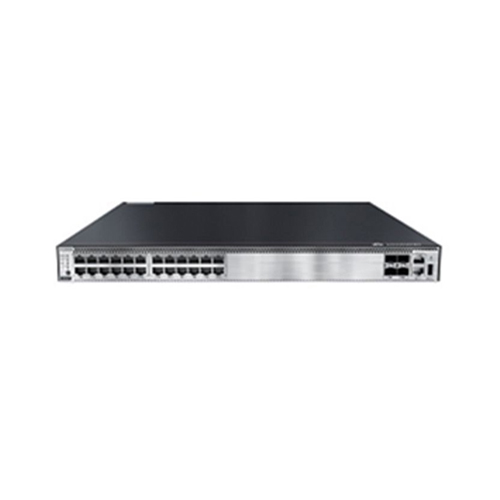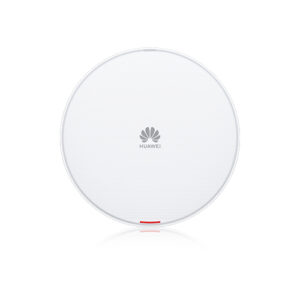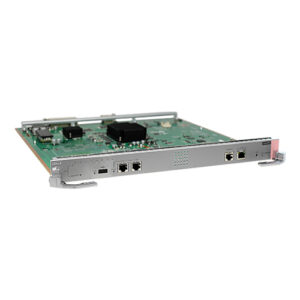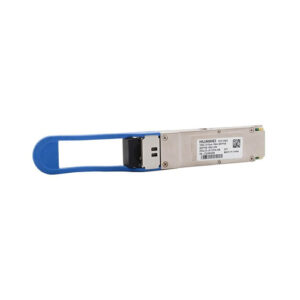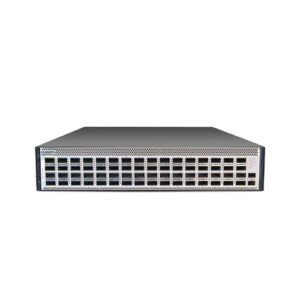Description
S5731-S24P4X Specification
Fixed port : 24 x 10/100/1000Base-T (PoE+) ports, 4 x 10GE SFP+ ports
Dimensions (W x D x H) : 442 mm x 420 mm x 43.6 mm
Chassis height : 1 U
Chassis weight (including packaging) : 8.6 kg
Power supply type : 1000 W PoE AC (pluggable)
Rated voltage range : AC input (1000 W AC PoE): 100 V AC to 240 V AC, 50/60 Hz
Maximum voltage range
• AC input (1000 W AC PoE): 90 V AC to 290 V AC, 45 Hz to 65 Hz
• High-voltage DC input (1000 W AC PoE): 190 V DC to 290 V DC (meeting 240 V high-voltage DC certification)
Maximum power consumption
• 121 W (without PD)
• 977 W (with PD, PD power consumption of 720 W)
Noise
•Under normal temperature (sound power): 62.3dB (A)
• Under high temperature (sound power): 71.8dB (A)
• Under normal temperature (sound pressure): 52.8dB (A)
Operating temperature
• 0-1800 m altitude: -5°C to +45°C
• 1800-5000 m altitude: The operating temperature reduces by 1ºC every time the altitude increases by 220 m.
Storage temperature : -40℃ to +70℃
Relative humidity : 5% to 95% (non-condensing)
Surge protection specification (service port) : Common mode: ±6 kV
Surge protection specification (power port)
• Differential mode: ±6 kV
• Common mode: ±6 kV
Heat dissipation
Air cooling heat dissipation, intelligent speed adjustment, and pluggable fans
MAC address table
IEEE 802.1d standards compliance
32K MAC address entries
MAC address learning and aging
Static, dynamic, and blackhole MAC address entries
Packet filtering based on source MAC addresses
VLAN
4094 VLANs
Guest VLAN and voice VLAN
GVRP
MUX VLAN
VLAN assignment based on MAC addresses, protocols, IP subnets, policies, and ports
VLAN mapping
Ethernet loop protection
RRPP ring topology and RRPP multi-instance
Smart Link tree topology and Smart Link multi-instance, providing millisecond-level protection switching
SEP
ERPS (G.8032)
BFD for OSPF, BFD for IS-IS, BFD for VRRP, and BFD for PIM
STP (IEEE 802.1d), RSTP (IEEE 802.1w), and MSTP (IEEE 802.1s)
BPDU protection, root protection, and loop protection
IP routing
Static routes, RIP v1/2, RIPng, OSPF, OSPFv3, IS-IS, IS-ISv6, BGP, BGP4+, ECMP, routing policy
Up to 16K FIBv4 entries
Up to 8K FIBv4 entries
Interoperability
VLAN-Based Spanning Tree (VBST), working with PVST, PVST+, and RPVST
Link-type Negotiation Protocol (LNP), similar to DTP
VLAN Central Management Protocol (VCMP), similar to VTP
IPv6 features
Up to 8K ND entries
PMTU
IPv6 Ping, IPv6 Tracert, and IPv6 Telnet
ACLs based on source IPv6 addresses, destination IPv6 addresses, Layer 4 ports, or protocol types
Multicast Listener Discovery snooping (MLDv1/v2)
IPv6 addresses configured for sub-interfaces, VRRP6, DHCPv6, and L3VPN
Multicast
IGMP v1/v2/v3 snooping and IGMP fast leave
Multicast forwarding in a VLAN and multicast replication between VLANs
Multicast load balancing among member ports of a trunk
Controllable multicast
Port-based multicast traffic statistics
IGMP v1/v2/v3, PIM-SM, PIM-DM, and PIM-SSM
MSDP
MVPN
QoS/ACL
Rate limiting in the inbound and outbound directions of a port
Packet redirection
Port-based traffic policing and two-rate three-color CAR
Eight queues per port
DRR, SP and DRR+SP queue scheduling algorithms
WRED
Re-marking of the 802.1p and DSCP fields of packets
Packet filtering at Layer 2 to Layer 4, filtering out invalid frames based on the source MAC address, destination MAC address, source IP address, destination IP address, TCP/UDP port number, protocol type, and VLAN IDQueue-based rate limiting and shaping on ports
Security
Hierarchical user management and password protection
DoS attack defense, ARP attack defense, and ICMP attack defense
Binding of the IP address, MAC address, port number, and VLAN ID
Port isolation, port security, and sticky MAC
MAC Forced Forwarding (MFF)
Blackhole MAC address entries
Limit on the number of learned MAC addresses
IEEE 802.1x authentication and limit on the number of users on a port
AAA authentication, RADIUS authentication, and HWTACACS authentication
NAC
SSH V2.0
HTTPS
CPU protection
Blacklist and whitelist
Attack source tracing and punishment for IPv6 packets such as ND, DHCPv6, and MLD packets
Secure Boot
IPSec
ECA
Deception
Reliability
LACP
E-trunk
Ethernet OAM (IEEE 802.3ah and IEEE 802.1ag)
ITU-Y.1731
DLDP
LLDP
BFD for BGP, BFD for IS-IS, BFD for OSPF, BFD for static route
VXLAN*
VXLAN L2 and L3 gateways
Centralized and distributed gateway
BGP-EVPN
Configured through the NETCONF protocol
Super Virtual Fabric (SVF)
A two-layer client architecture is supported.
IGMP snooping can be enabled on access switches (ASs) and the maximum number of access users on a port can be configured.
ASs can be independently configured. Services that are not supported by templates can be configured on the parent.
Third-party devices are allowed between SVF parent and clients.
Working as an SVF client that is plug-and-play with zero configuration
iPCA
Directly coloring service packets to collect real-time statistics on the number of lost packets and packet loss ratio
Collection of statistics on the number of lost packets and packet loss ratio at network and device levels
TWAMP
Two-way IP link performance measurement
Measurement on two-way packet delay, one-way packet loss rate, and one-way packet jitter
Management and maintenance
iStack, with up to 9 member switches in a stack
SNMP v1/v2c/v3
RMON
Smart Application Control (SAC)
Web-based NMS
System logs and alarms of different levels
GVRP
MUX VLAN
NetStream
Intelligent O&M

